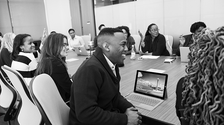At some point in your career – either academic- or work-related – you have experienced that feeling of getting ready for a job interview, especially if the business you are interested in is posting new opportunities you don’t want to miss out.
If you are looking at some vacancies available to work in Italy, then this article is for you! Indeed, I am going to tell you more about:
• Some of the most common questions you may be asked to answer from the interviewer
• How to answer professionally and make sure to deliver the right message to your interlocutor
• And lastly, some useful vocabulary you may need to make you stand out and nail the interview
Disclaimer: please note that I am not a recruiter and all the questions we are going through in this article are based only on my experience as an interviewee. Despite this, I hope my article will provide you with some useful hints and if you want to see any more Business Italian articles from me in the future, please let me know in the comment section down below.
Let’s get started!
A job interview usually follows the same steps, and the conversation is very likely to start with some very quick greetings and small talk, then the interviewer may introduce themselves first and right after start asking questions to know more about you. The first question is usually very general and ice-breaking.
It aims to make you feel comfortable by talking about what you have more confidence with, that is to say: YOU.
1. Buongiorno, mi parli di Lei
Through this question, the interviewer wants to know something about you (Lei is the formal second-person pronoun for Tu) and your professional background. This is an open question, so it gives you a lot of ground to cover, but I suggest that you be very straight to the point and avoid beating around the bush. You can talk about your academic and professional background, what experiences you have in that field, and in general something that is related to the job position you are applying to, and could give the interviewer the feeling that you are the right fit for the role.
Let's see an example:
Dopo aver conseguito la Laurea Magistrale in (degree, e.g. Economia aziendale), sono stato/-a assunto/-a presso (what kind of company and sector you worked in, e.g. presso un’azienda nel settore metalmeccanico).
Ho lavorato 5 anni (years of experience) in contabilità (job division in the company)/come contabile (job position you covered during that time) e ho avuto modo di crescere molto in questo settore.
Motivo per il quale, dopo 5 anni di esperienza acquisiti all’interno di un team di 10 persone, sono stato promosso a manager del reparto.
2. Di cosa si occupava quando lavorava a/per (company/brand name)...?
This question aims to give the interviewer more details about your previous work experiences with other companies. They want to know what job positions you covered in your previous jobs and understand if you could be a good candidate and have the experience they need for the role.
An example of an answer you can give is:
Il ruolo che ricoprivo presso ____ (company name) era principalmente di amministrazione e contabilità. Mi occupavo di (your tasks and duties, e.g. emissione e registrazione delle fatture e di note di credito o debito). Ero responsabile della parte relativa alle vendite, perciò emettevo fatture e documenti di trasporto, registravo i pagamenti e sollecitavo direttamente i clienti in merito ai pagamenti scaduti.)
Note that in Italian when we talk about habits, or recurrent actions we used to do in the past, especially in the form of storytelling, we use the Imperfetto mood.
3. Come mai si è candidato/-a a questa posizione?
Here the interviewer wants to hear from you if you’re genuinely interested in the position and what contribution you can give to the company with your skills.
Make sure to read carefully the job post before you apply, and study what kind of skills are required to perform that specific job role.
An example of the answer can be:
Penso che la mia esperienza di quasi 5 anni nel mondo___(sector, e.g. del marketing) mi abbia insegnato (Congiuntivo mood)... (list at least 3 things you learnt and mastered from your previous job experiences that are relevant for this job position, e.g. a gestire i contatti e le relazioni con le persone in maniera professionale). Infatti, ho sin da subito appreso ad essere flessibile e a saper gestire le priorità, rispettando sempre le scadenze.
Inoltre, la mia formazione in ___ (sector, e.g. comunicazione e marketing) mi ha fornito gli strumenti necessari allo sviluppo delle mie competenze tecniche in modo efficace.
4. Quali considera i suoi punti di forza e debolezza?
Through this question, the interviewer wants to know whether you can self-assess your skills, by balancing strengths and weaknesses.
What is important here, is your ability to describe yourself efficiently, namely, by mentioning what is considered relevant for the job position, and of course, giving an overview of yourself by considering both sides of your personality.
So, if you are applying for a position in a team, surely it is worth mentioning that you can work.
An example of the answer can be:
Mi reputo una persona molto precisa e attenta al dettaglio. Quando mi trovo di fronte ad una problematica, mi focalizzo principalmente sulla natura del problema, andando ad identificare l’elemento scatenante. Questa capaictà mi permette di essere molto analitico nel mio lavoro e a lavorare con grande precisione. Tuttavia, riconosco per potrebbe essere anche un mio punto debole, perché analizzare il singolo problema, a volte, non mi permette di avere il quadro completo della situazione e quindi a non avere tutte le informazioni necessarie per arrivare alla risoluzione.
5. Perché dovremmo assumerla?
Through this question, the interviewer wants to know from you what contributions you can give to the company with your skills.
Be sure to be as thorough as possible and, of course, to convince them that you are the right person!
An example of the answer can be:
Credo che la mia formazione accademica e professionale sia (Congiuntivo mood) in linea con la figura che state cercando.
Posso, infatti, vantare 5 anni di esperienza nel settore, che mi hanno permesso di crescere dal punto di vista professionale, ma anche personale.
Sono fluente anche in inglese e francese perché ho vissuto e studiato 5 anni a Londra e 4 a Parigi. La padronanza di queste lingue mi ha permesso di lavorare sempre con un pubblico internazionale e multiculturale.
6. Dove si vede tra 5 anni a livello lavorativo?
This question is for planners and focus-oriented people. Just kidding!
You have to show the interviewer you are a driven and confident person, who knows very well what goals to achieve and of course, who dreams big.
An example of the answer can be:
Fra cinque anni vorrei (Conditional mood) arrivare a ricoprire un ruolo di responsabilità e gestire un proprio team.
Sono certo che in questa azienda avrò l’opportunità di crescere professionalmente e di costruire ed implementare le conoscenze necessarie al raggiungimento del mio obiettivo.
Sono fiducioso che tale prospettiva potrà concretizzarsi per la mia crescita professionale, ma anche personale.
7. Ha domande?/Desira avere chiarimenti su qualche aspetto in particolare? It is now your turn to really show them interest!
This is an open question, which more than knowing if you have any curiosity related to a specific aspect, wants to understand if you are really interested in the position.
Prove the interviewer right!
So, make always sure to prepare a bunch of questions the days before the interview. A good question could start:
Sì, vorrei avere maggiori informazioni su... (topic, any doubt you have e.g. sul tipo di attività quotidiane che spetteranno al candidato)
You can also reply with another open question:
Se potesse, quale consiglio darebbe alla risorsa selezionata?
The interview has finished!
Congratulations!
Now, let’s move to some Useful VOCABULARY to enrich your Answers! Let's see what adjectives you can use to demonstrate responsibility:
• Puntuale: Sono una persona puntuale e cerco di rispettare sempre le scadenze • Responsabile: quando accetto un incarico, mi ritengo responsabile a 360° • Costante: Sono costante e spesso riesco a raggiungere i miei obiettivi • Affidabile: Mi ritengo una persona affidabile perché cerco sempre di rispettare la mia parola.
Let's see now what adjectives you can use to demonstrate enthusiasm:
• Ottimista: (both for men and women) Penso di essere una persona molto ottimista, vedo sempre il lato positivo degli eventi.
• Appassionato: Sono molto appassionato del mio lavoro
• Determinato: Sono sempre stato molto determinato nel raggiungere i miei obiettivi • Volenteroso: Credo che le persone volenterose siano quelle che hanno più possibiltà di fare carriera
And lastly, let’s see what adjectives you can use to demonstrate teamwork:
• Di aiuto: Mi piace sentirmi di aiuto per le persone
• Incoraggiante: Le persone incoraggianti sono importanti in un gruppo • Collaborativo: Essere collaborativo è un requisito imprescindibile per poter lavorare con altre persone
So, good, that’s all for today!
This is all I wanted to tell you about how to answer an Italian interview and I hope that you will apply some of my suggestions during your interview!
Of course, if you have any questions, please let me know in the comment section down below.
Thank you for reading this article.
If you want to learn more about me, feel free to check out my profile! Ciao!







